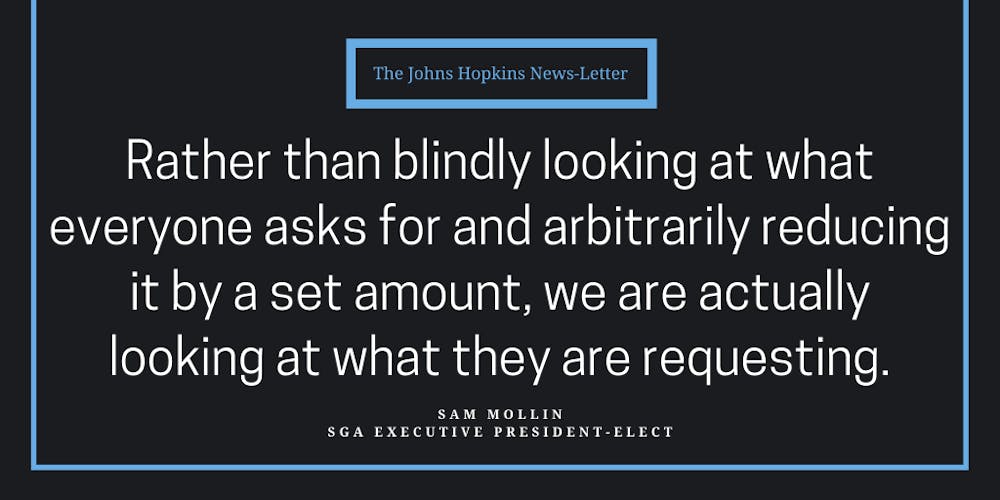Incoming Student Government Association (SGA) Executive Treasurer Addy Perlman announced in an email to student leaders that student groups should expect cuts in their annual Student Activities Commission (SAC) fundings. The announcement was made in light of the University-wide austerity measures and was further discussed at the final weekly SGA meeting.
Perlman noted in her Tuesday email that the budget allocation would be prioritized towards events that would have the most impact on the Hopkins community. She asked the group leaders to consider the possibility of collaborating with other student groups to pool their resources and create bigger events together.
In an email to The News-Letter Perlman noted that the SGA is expecting the overall cuts to be around 10 to 15 percent. She added that this figure is subject to change based on further progression of the coronavirus (COVID-19) pandemic.
SGA President-elect Sam Mollin expressed his regret regarding the current situation. He pledged to communicate frequently with student leaders and ensure that the budget allocation process is carried out in a transparent and fair manner.
“After the inauguration on May 5, I’m going to make sure we’re sending out more frequent emails and we’re more available to answer questions from concerned student leaders,” Mollin said. “Hopefully working together, we can get through this and still be sure that we are providing a great student organization experience that students are used to.”
Mollin also said that there will be changes in the way budget applications will be reviewed, noting that the new system will be more equitable and intentional.
“The way things used to happen was that clubs always requested a little more than they might think they need because they understood that you get a percentage of what you asked for,” he said. “The way we are doing it this time is that rather than blindly looking at what everyone asks for and arbitrarily reducing it by a set amount, we are actually looking at what they are requesting.”
Perlman added that she would implement a line-by-line budget system that would help her better gauge the needs of each student group. While the budget caps for funding categories remain in place for FY 2021, she noted her hopes to implement more comprehensive guidelines for FY 2022.
“I want to understand more about each group and their requests so that groups are allocated funding for their needs rather than just applying the budget caps,” Perlman wrote. “My goal is to continue to reform the process and potentially add an appeal process for student groups.”
Funding process for new groups will not change, according to Perlman. They will continue to be able to apply for the $100 start-up grant and SAC monthly grants.
Sophomore Michael Lin, the current treasurer of the Chinese Students Association and incoming co-president of the Eclectics Dance Group, shared his plans to work around the expected budget cuts for both of the student organizations.
“We hope to get our members involved in more fundraiser activities,” Lin said. “Secondly, student leaders will need to meet and take inventory of current supplies and see what can be reused or see what items may not be totally essential for events.”
Furthermore, Lin also said that they are hoping to find additional outside funding through applying for grants, noting that the pandemic means costs for in-person events will increase if students return to campus in the fall.
“Student leaders will also need to consider the safety and health of the Hopkins community in terms of planning their events, which may include greater costs of health-related supplies, such as sanitizers, face masks and gloves, in organizations’ budgets,” Lin said.
Sophomore Mario Aguirre, the deputy vice president of finance of the Hopkins Undergraduate Debate Council, expressed concern that reduced budgets would mean the group has to reduce the number of tournaments they attend and be more selective about how many members attend those tournaments.
“A lot of our budget is spent on registering for debate tournaments and traveling to said tournaments. If budgets are slashed, it’s likely that newer members won’t have as many opportunities to go to tournaments as they usually would,” Aguirre said. “In the long run, we become less competitive as a team because we don’t get the experience in competing in these tournaments.”
In her email to student group leaders, Perlman noted the extraordinary nature of the COVID-19 pandemic and encouraged the student body to reach out to her.
“We are doing our best to ensure that groups receive funding and are able to continue to provide the joy and community that comes with being a member,” Perlman wrote. “This is an unprecedented situation, so please bear with us as we try our best to allocate funds fairly, while remaining within a potentially more restricted budget.”
Addy Perlman is a staff writer for The News-Letter. She was not involved in the reporting, writing or editing of this article.
Michelle Limpe contributed reporting to this article.





